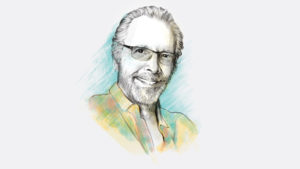GRAMMY NOMINEE HERB ALPERT RECALLS ASKING MR. DEMILLE FOR HIS CLOSE-UP

ILLUSTRATION BY SPIROS HALARIS FOR VARIETY
Herb Alpert’s latest Grammy nomination, for contemporary instrumental album for “Human Nature,” puts the timeless music artist in the kudos hunt again,a quest he’s familiar with as he started competing and winning music industry awards more than 50 years ago.
When Variety first name-checked Alpert back in 1961, he was vocalist “Dore Alpert,” touted for work in a never-produced film. He’d already worked as an extra for Cecil B. DeMille on “The Ten Commandments,” co-written hits for Jan and Dean and the legendary R&B artist Sam Cooke, but he hadn’t recorded the single that launched him into the music business stratosphere. That record, “The Lonely Bull,” and his band, the Tijuana Brass, were only a year away.
In addition to writing and making records, you made it into a Cecil B. DeMille film?
I worked as an extra at Paramount for three months and played kettle drums and the aida horn. I think I was one of about 200 extras.
Did working on a big Hollywood studio film teach you any showbusiness lessons?
We were shooting the famous ‘golden calf’ scene and one of the shots began with my back to the camera. After one take, I went up to Cecil B. DeMille and asked him, “Could you open the shot on my face?” He said, “Not this time, kid.”
That’s a lesson in humility.
DeMille had three guys following him around and one of them carried a stool everywhere, so when DeMille wanted to sit down, he just did it without ever looking back.
What about your time as an upcoming artist named Dore Alpert at RCA?
It was the best possible experience in terms of everything being negative and learning everything I never wanted to do when I started A&M Records with Jerry Moss.
Such as?
I was not crazy about the way they ran their recording sessions. The studio was cold and I don’t mean in terms of temperature. They numbered their takes, no name on anything, so I was just a number. If I went into the control room to listen to a playback God forbid I’d suggest an idea such as putting trumpet on the song or adding more bass. I’d immediately be in an argument with a union guy. I made the mistake of touching one of faders on the control board and the engineer literally slapped my hand and said, “This is a union place. Don’t ever do that.” They did not believe the music should revolve around so I remembered all this information and I knew that all artists are insecure and you want the recording studio to make them feel good, not nervous and uptight.
Any other key lessons or teachers?
Sonny Bono was the A&R guy at Specialty Records and he was very discouraging. He actually said I should get out of the business. But there were people like Sam Cooke. He was an extraordinary guy, a teacher, but I’m not sure he even knew it.
You co-wrote “Wonderful World,” which was one of Cooke’s big hits.
We did that as a demo for Keen Records. Everyone was so unsure about the song that they put it on the backburner and never cut re-cut it. Two years later, after Sam left Keen and went to RCA, Keen released the demo as competition to the RCA recordings, which so far hadn’t clicked.
Things were moving fast. You were writing hits, you had a label deal and then you had a label.
In 1962, Jerry Moss and I became partners in A&M on a handshake. We never had a contract until we sold the company 25 years later.
